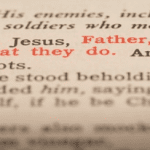
“Ain’t there nothing sacred no more, lord, ain’t there nothing sacred no more?” – David Allan Coe
A Church is broken into, and the Tabernacle is stolen. A person curses God. These are examples of sacrilege and blasphemy. In a secular and postmodern world, these terms will likely be considered old-fashioned or even ignorant. Yet these examples raise an important question. Has human history reached a place where there is no room for the transcendent? And if that is the case, are there consequences for a society that holds nothing sacred?
In this paper, I shall suggest that mankind’s loss of a sense of the sacred has had a deleterious effect on human history and on the human soul. I will first discuss the meaning of sacrilege and blasphemy from a biblical and Catholic perspective. I will conclude by suggesting that a return to respecting that which is sacred is essential to human flourishing.
Sacrilege
Passing from Latin to French, sacrilege has been defined as stealing what has been consecrated to God.
While generally referring to the destruction of property, sacrilege can also involve deliberate acts against persons or objects that have been consecrated to God precisely because they have been so consecrated. Examples include violence against members of the clergy or members of a religious order, damaging or destroying anything belonging to the Church, and deliberately treating the Eucharist with irreverence. It is, therefore, no surprise that the Catholic Church considers sacrilege a sin against the virtue of religion. Nor should it be surprising that the Bible strongly denounces sacrilege.
“You shall not invoke the name of the Lord, your God, in vain. For the Lord will not leave unpunished anyone who invokes his name in vain.” Thus saith the second commandment, which provides the biblical foundation for condemning sacrilege. (See Exodus 20:7).
Examples of sacrilege in the Old Testament include Aaron’s sons’ unauthorized actions while maintaining the Temple (see Leviticus 10:1-2) and the destruction of Soloman’s Temple by the Babylonians (See Jeremiah 52:12-13).
Arguably the most famous depiction of sacrilege in the New Testament involves the cleansing of the Temple. The Temple was the center of Jewish religious life, yet at the time of Jesus, it had become a place of commerce. Saint Matthew writes, “And Jesus entered the Temple and drove out all who sold and bought in the Temple, and he overturned the tables of the money-changers and the seats of those who sold pigeons. He said to them, “It is written, ‘My house shall be called a house of prayer,’ but you make it a den of robbers.” (See Matthew 21:12-17).
It is not uncommon to consider sacrilege as a synonym for blasphemy. However, there are substantial differences.
Blasphemy
Of Latin and Greek etymology, blasphemy is defined as insulting or speaking contemptuously of another. If sacrilege is a physical action against God or people or places consecrated to God, then blasphemy is speaking against God contemptuously, scornfully, or violently.
As such, blasphemy may include offenses committed by thought, word, or action. Disdainful ridicule of the saints and contempt of sacred objects or persons consecrated to God is also blasphemous because God is indirectly attacked.
The sin of blasphemy can take different forms, from cursing the name of God (see Leviticus 24:10-16) to rejecting God’s mercy (that is, blasphemy against the Holy Spirit, see Matthew 12:31).
In the ancient world of the Bible, blasphemy was considered a grave violation of charity toward God. As such, it was often punishable by death. Still, as with all sins, for a person to sin gravely in this manner, he must use blasphemous expressions and realize the contemptuous meaning of what he says or does.
All of this leads to an interesting theological question. Accepting that God is non-contingent (He requires nothing extrinsic to His nature) and that God is impassible (He cannot suffer in His Divine nature), then why are sacrilege and blasphemy so strongly condemned by the Bible and by Catholic tradition? After all, God cannot suffer from anything done by His creation.
The Effect Of Losing What Is Sacred
Like all sins, those of sacrilege and blasphemy damage – and in some cases, sever entirely – our relationship with God.
I will mention two reasons that the sins of sacrilege and blasphemy are so severe. The first is that these sins turn human beings away from the ultimate truth of God. The consequence of turning away from the truth of God destroys the virtue of humility, without which repentance is impossible. Without repentance, salvation is impossible.
The second reason sacrilege and blasphemy are such serious offenses is that they not only damage our relationship with God but also lead to a disordering of our human nature. It is helpful to examine human nature in light of one of Aristotle’s four causes to see why this is the case.
Aristotle identified four ways of explaining a particular thing. They are the efficient cause, the formal cause, the material cause, and the final cause. Only the final cause is of relevance to this argument.
The final cause is the purpose for which a thing is made. For example, a chair is made for the purpose of allowing someone to sit down. As Saint Augustine observed, human beings are made for God. God is our final cause. When we commit blasphemy or sacrilege, we damage or even destroy the charity in our hearts necessary for communion with God. The result is that we frustrate the reason for which we are made. And like a chair that no one can sit on, our destiny and reason for being are unrealized.
More and more, there is less and less of a sense of sacredness in society. If human beings are indeed made for God, what are the consequences of losing what is sacred?
In this paper, I have endeavored to explain and provide examples of sacrilege and blasphemy. Additionally, I have suggested that not only do the sins of sacrilege and blasphemy damage our relationship with God, but by profaning God, we cause innumerable damage to our nature.
















